
приборы + электрообор / Intruduction / Introduction(CHART)
.pdf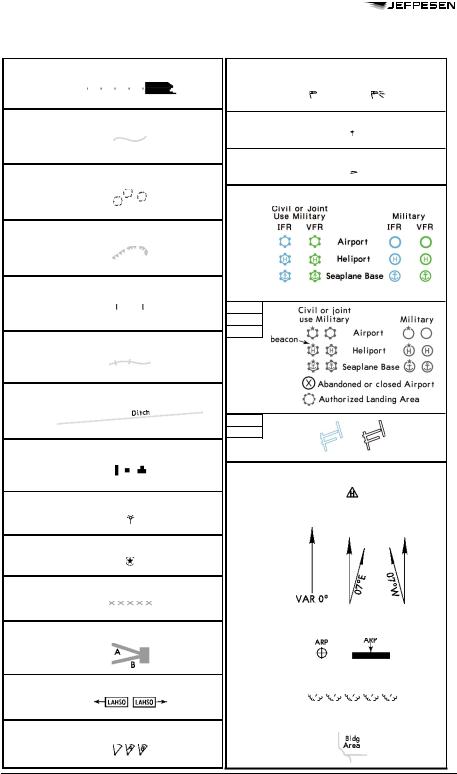
SYMBOLS-6 |
INTRODUCTION |
2 MAR 12 |
Symbol Category: AIRPORT
APT-PL |
|
RAIL |
|
|
|
|
|
APT-PL |
|
Road |
|
|
|
|
|
APT-PL |
Trees |
||
|
|
|
|
APT-PL |
|
Bluff |
|
|
|
|
|
|
|
||
APT-PL |
Pole Line |
||
|
|
||
APT-PL |
Railroad |
||
|
|
Ditch |
|
APT-PL |
|
||
|
|
||
APT-PL |
Buildings |
||
|
|
||
APT-PL |
Lighted Pole |
||
|
|
||
APT-PL |
Unidentified Beacon |
||
|
|
||
APT-PL |
Permanently Closed Taxiway |
||
APT-PL |
Wind Indicator |
|
|
Cone |
Lighted Cone |
|
|
|
APT-PL |
|
Tee |
|
|
|
APT-PL |
|
Tetrahedron |
|
|
Airports |
ENRT-A |
|
|
ENRT-L |
|
|
ENRT-H |
|
|
ENRT-H/L |
|
|
APCH-PL
APT-PL
SID/STAR
APCH-PL
ENRT-A
APT-PL |
Helicopter Landing Pad |
|
|
APT-PL |
Magnetic Variation |
|
|
APT-PL |
Airport Reference Point (ARP) |
|
APT-PL |
Taxiway and Apron |
|||
|
|
|||
|
|
|
|
|
APT-PL |
LAHSO Distance Points |
APT-PL |
Tree Line |
|
|
|
|||
|
|
|
|
|
|
|
APT-PL |
Building Area |
|
APT-PL |
RVR Measuring Site |
|
|
© JEPPESEN, 2012. ALL RIGHTS RESERVED.

2 MAR 12 |
INTRODUCTION |
SYMBOLS-7 |
Symbol Category: ROUTES & |
|||||||
|
|
|
|
AIRWAYS |
|||
APCH-PL |
|
|
Track/Airway |
||||
APCH-PR |
|
|
|
|
|
|
|
SID/STAR |
|
|
|
|
|
|
|
ENRT-A |
|
|
|
|
|
|
|
ENRT-L |
|
|
|
|
|
|
|
ENRT-H |
|
|
|
|
|
|
|
ENRT-H/L |
|
|
|
|
|
|
|
ENRT-L |
|
|
Overlying High Altitude Airway |
||||
|
|
|
|
|
|
|
|
|
|
|
|
|
|
|
|
ENRT-L |
|
|
Diversionary Route |
||||
|
|
|
|
|
|
|
|
APCH-PR |
|
|
Non-precision when charted |
||||
|
|
|
with precision approach |
||||
|
|
|
|
|
|
|
|
ENRT-A |
|
|
Arrival/Departure Route |
||||
|
|
|
|
|
|
|
|
|
|
|
|
||||
SID/STAR |
|
|
Transition Track |
||||
|
|
|
|
|
|
|
|
APT-PL |
|
High Level Approach Track |
|||||
|
|
|
|
|
|
|
|
|
|
|
|
|
|
||
APCH-PL |
|
|
|
Visual Track |
|||
APCH-PR |
|
|
|
|
|
|
|
|
|
|
|
|
|
|
|
APCH-PR |
|
|
|
VNAV/VDA |
|||
|
|
|
Vertical descent angle and/or path |
||||
|
|
|
|
||||
APCH-PR |
|
|
Vertical descent angle and/or path |
||||
|
|
|
to DA for approved operators |
||||
|
|
|
|
|
|
|
|
SID/STAR |
|
|
Radar Vectors |
||||
|
|
|
|
|
|
|
|
APT-PL |
|
|
Missed Approach Course |
||||
|
|
|
|
|
|
|
|
ENRT-A |
|
|
Navigational Signal Gap |
||||
ENRT-L |
|
|
|
|
|
|
|
ENRT-H |
|
|
|
|
|
|
|
ENRT-H/L |
|
|
|
|
|
|
|
SID/STAR |
Altitude Change |
“ |
” |
|
|
|
T |
|
|
ENRT-A |
MEA, MAA, MOCA, or MORA change. |
|
||
ENRT-L |
Does not apply to GPS MEA’s or at Navaids |
|
||
ENRT-H |
|
|
|
|
ENRT-H/L |
|
|
|
|
ENRT-A |
Total Milage |
|
ENRT-L |
Total Mileage between Navaids |
|
ENRT-H |
|
|
ENRT-H/L |
|
|
SID/STAR |
Change Over Point |
|
ENRT-A Mileages indicate point to change Navaids |
||
ENRT-L |
|
|
ENRT-H |
|
|
ENRT-H/L |
|
|
ENRT-A |
Even and Odd Indicators |
|
ENRT-L |
Even and Odd altitudes are used |
|
|
in direction indicated |
|
ENRT-H |
||
|
||
ENRT-H/L |
|
|
|
|
|
ENRT-A |
Prior Permission Required |
|
ENRT-L |
Prior Permission Required from ATC |
|
|
for flight in direction of arrow. |
|
ENRT-H |
||
|
||
ENRT-H/L |
|
|
|
|
|
ENRT-A |
Flight Planned Route |
|
ENRT-L |
|
|
ENRT-H |
|
|
ENRT-H/L |
|
|
|
|
|
ENRT-A |
Airway By-Pass |
|
ENRT-L |
|
|
ENRT-H |
|
|
ENRT-H/L |
|
|
|
|
|
APCH-PL |
Airway Designator |
|
SID/STAR |
Negative |
|
ENRT-A |
|
|
ENRT-L |
|
|
ENRT-H |
|
|
ENRT-H/L |
|
|
APCH-PL |
Positive |
|
|
|
|
ENRT-A |
Route Suffix |
|
ENRT-L |
Suffixes are added to indicate more |
|
|
restrictive segment along airway. |
|
ENRT-H |
||
Each suffix has a unique meaning. |
||
ENRT-H/L |
|
|
|
|
|
ENRT-A |
One Way Airway |
|
ENRT-L |
|
|
ENRT-H |
|
|
ENRT-H/L |
|
|
© JEPPESEN, 2012. ALL RIGHTS RESERVED.
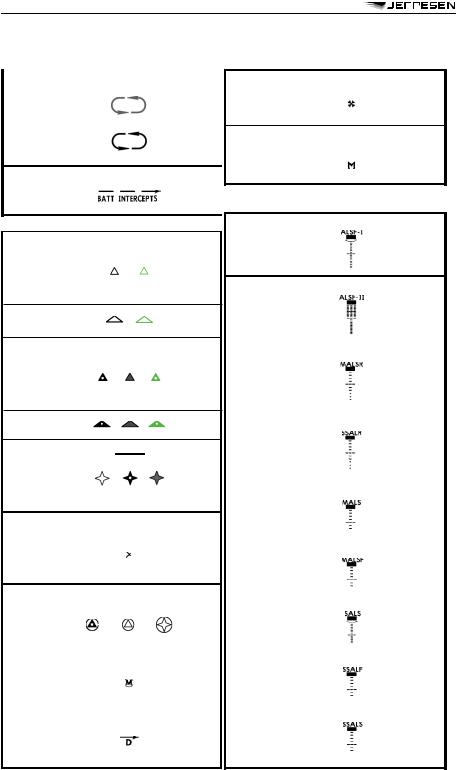
SYMBOLS-8 INTRODUCTION 2 MAR 12
Symbol Category: ROUTES & |
|
|
||
|
AIRWAYS |
|
|
|
APCH-PL |
Holding Patterns |
|
APCH-PR |
Non Precision Final Approach Fix |
APCH-PR |
|
|
|
|
APT-PL |
|
|
|
|
SID/STAR |
|
|
|
|
ENRT-A |
|
|
|
|
ENRT-L |
|
|
APCH-PR |
Non Precision |
|
|
|
||
ENRT-H |
|
|
|
Missed Approach Fix |
|
|
|
|
|
ENRT-H/L |
|
|
|
|
SID/STAR |
Intercept Route |
|
|
|
ENRT-A |
|
|
Symbol Category: LIGHTING BOX & |
|
ENRT-L |
|
|
||
|
|
|
MISSED APPROACH |
|
ENRT-H/L |
|
|
|
|
Symbol Category: AIRSPACE FIXES |
APCH-PR |
Standard ALSF-I |
||
|
|
|
|
|
|
Non-Compulsory |
|
|
|
APCH-PL |
|
|
||
SID/STAR |
|
|
|
|
ENRT-A |
|
|
|
|
ENRT-L |
|
|
|
|
ENRT-H |
|
|
APCH-PR |
Standard ALSF-II |
|
|
|
||
ENRT-H/L |
|
|
|
|
ENRT-H/L |
|
|
|
|
APCH-PL |
Compulsory |
SID/STAR |
|
ENRT-A |
|
ENRT-L |
|
ENRT-H |
|
ENRT-H/L |
|
ENRT-H/L |
|
|
|
APCH-PL |
RNAV |
SID/STAR |
|
ENRT-A |
|
ENRT-L |
|
ENRT-H |
|
ENRT-H/L |
|
|
APCH-PR |
MALSR |
|
APCH-PR |
SSALR |
|
APCH-PR |
MALS |
APCH-PL |
Mileage Break/CNF |
|
|
|
|
SID/STAR |
Non-Compulsory Fix |
|
|
|
|
ENRT-A |
|
|
APCH-PR |
MALSF |
|
ENRT-L |
|
|
|
|
|
ENRT-H |
|
|
|
|
|
ENRT-H/L |
|
|
|
|
|
APCH-PL |
Fly Over Fix |
|
|
|
|
SID/STAR |
Indicated by circle around fix |
APCH-PR |
SALS |
||
|
|
|
|
|
|
|
|
|
|
|
|
ENRT-A |
Meteorological Report Point |
APCH-PR |
SSALF |
|
|
|
|
|
|
|
|
ENRT-L |
|
|
|
|
|
|
|
|
|
|
|
ENRT-H |
|
|
|
|
|
ENRT-H/L |
|
|
|
|
|
|
|
|
|
|
|
SID/STAR |
DME and DME Radial Formation |
APCH-PR |
SSALS |
||
ENRT-A |
|
|
|
|
|
ENRT-L |
|
|
|
|
|
ENRT-H |
|
|
|
|
|
ENRT-H/L |
|
|
|
|
|
|
|
|
|
|
|
|
|
|
|
© JEPPESEN, 2012. ALL RIGHTS RESERVED. |
|
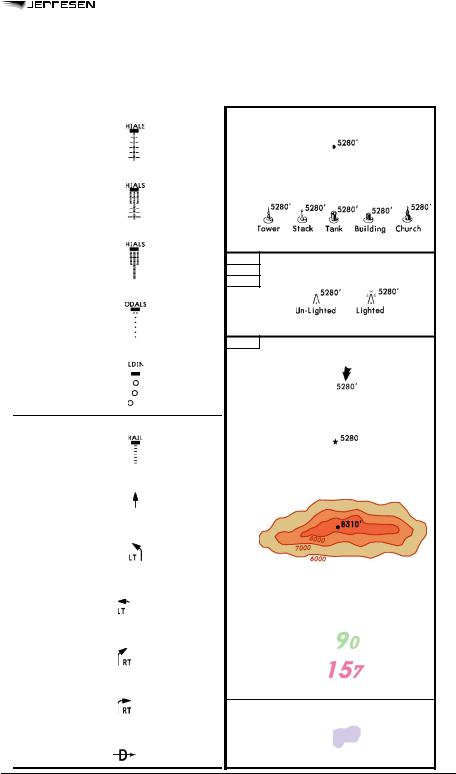
2 MAR 12 |
INTRODUCTION |
SYMBOLS-9 |
Symbol Category: LIGHTING BOX &
MISSED APPROACH
APCH-PR |
HIALS (Calvert) |
|
|
APCH-PR |
HIALS (Calvert II) |
|
|
APCH-PR |
HIALS |
|
|
APCH-PR |
ODALS |
|
|
APCH-PR |
LDIN |
|
RAIL |
APCH-PR |
|
|
|
APCH-PR |
Climb |
|
|
APCH-PR |
Left Turn (less than 45^) |
|
|
APCH-PR |
Left Turn (greater than 45^) |
|
|
|
|
APCH-PR |
Right Turn (less than 45^) |
|
|
|
|
APCH-PR |
Right Turn (greater than 45^) |
|
|
|
|
APCH-PR |
Direct |
|
|
|
|
Symbol Category: TERRAIN
APCH-PL |
Natural Terrain High Point |
|
APT-PL |
||
|
||
SID/STAR |
|
|
ENRT-A |
|
|
|
|
|
APCH-PL |
Man-made High Point |
|
APT-PL |
||
|
||
SID/STAR |
|
APCH-PL Unidentified Man-made Structure
APT-PL
SID/STAR
APCH-PL |
Highest Arrow |
|
APCH-PL |
Hazard Beacon |
|
APT-PL |
||
|
||
SID/STAR |
|
|
|
|
|
APCH-PL |
Generalized Terrain Contours |
|
APT-PL |
|
|
SID/STAR |
|
|
ENRT-A |
|
ENRT-A |
Grid MORA |
ENRT-L |
|
ENRT-H |
|
ENRT-H/L |
|
APCH-PL |
Water |
APT-PL |
|
ENRT-A |
|
ENRT-L |
|
ENRT-H |
|
ENRT-H/L |
|
© JEPPESEN, 2012. ALL RIGHTS RESERVED.
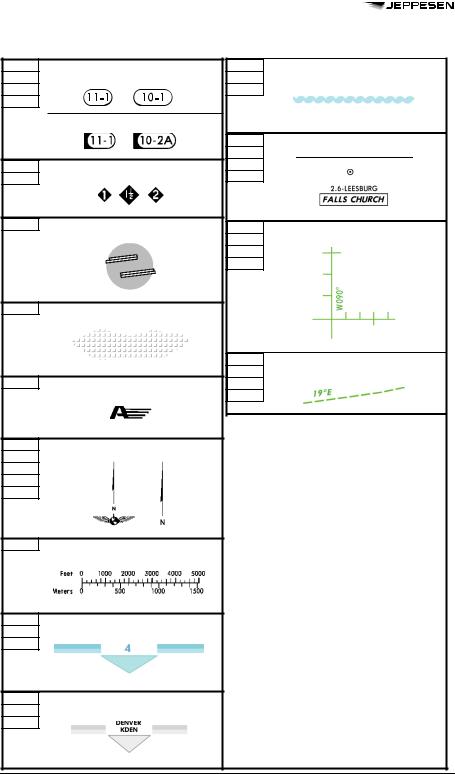
SYMBOLS-10 |
INTRODUCTION |
2 MAR 12 |
Symbol Category: MISCELLANEOUS
APCH |
Index Number Oval |
APT |
Standard Airway Manual Charts |
|
|
SID/STAR |
|
ENRT-A |
|
|
For Special Coverage Charts |
APCH-PL |
Holding Pattern Length |
SID/STAR |
|
SID/STAR |
Arrival/Departure Airport |
APCH-PL |
City Pattern |
APCH-PL |
Airline Chart Icon |
APT-PL |
North Arrow |
ENRT-A |
|
ENRT-L |
|
ENRT-H |
|
ENRT-H/L |
|
APT-PL |
Bar Scale |
ENRT-L |
Enroute Chart Overlap |
ENRT-H |
|
ENRT-H/L |
|
ENRT-L |
Area Chart Overlap |
ENRT-H |
|
ENRT-H/L |
|
ENRT-L
ENRT-H
ENRT-H/L
ENRT-A
ENRT-L
ENRT-H
ENRT-H/L
ENRT-A
ENRT-L
ENRT-H
ENRT-H/L
ENRT-A
ENRT-L
ENRT-H
ENRT-H/L
Inset Boundary
Remote Communications
Outlet (RCO)
Grid
Isogonic Line
END OF SYMBOLS LEGEND
© JEPPESEN, 2012. ALL RIGHTS RESERVED.
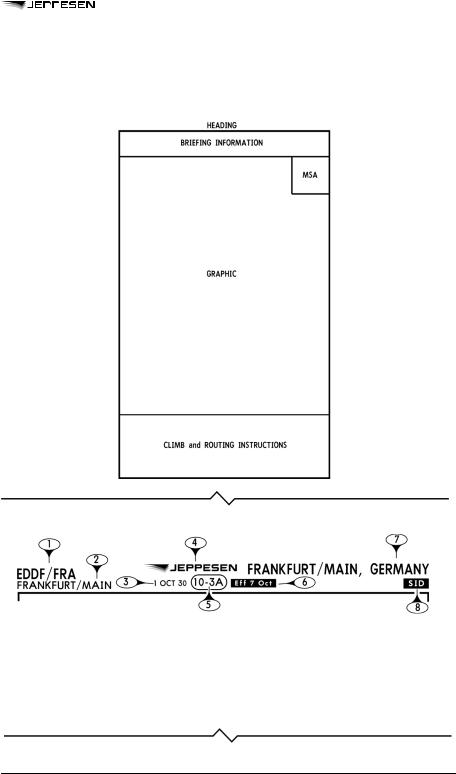
2 MAR 12 |
INTRODUCTION |
SID/STAR-1 |
SID/DP AND STAR CHART LEGEND
The SID & STAR section of the Jeppesen legend provides a general overview and depiction of Standard Instrument Departure (SID), Departure (DP), Standard Terminal Arrival Route/Standard Instrument Arrival (STAR), and Arrival charts. These charts are graphic illustrations of the procedures prescribed by the governing authority. A text description may be provided, in addition to the graphic, when it is supplied by the governing authority. All altitudes shown on SID/DP and STAR charts are MSL unless otherwise specified. All mileages are nautical, all radials and bearings are magnetic unless otherwise specified.
HEADING
1 — |
ICAO indicators and IATA identifiers. |
6 — |
Chart effective date. |
2 — |
Airport name. |
7 — Geographical location name. |
|
3 — |
Chart revision date. |
8 — |
Chart type identifier. |
4 — Jeppesen company logo. |
|
|
|
5 — |
Index number. |
|
|
|
Charts are sequenced alphabetical or by |
|
|
|
runway number within similar type arrivals or |
|
|
|
departures. |
|
|
© JEPPESEN, 2012. ALL RIGHTS RESERVED.
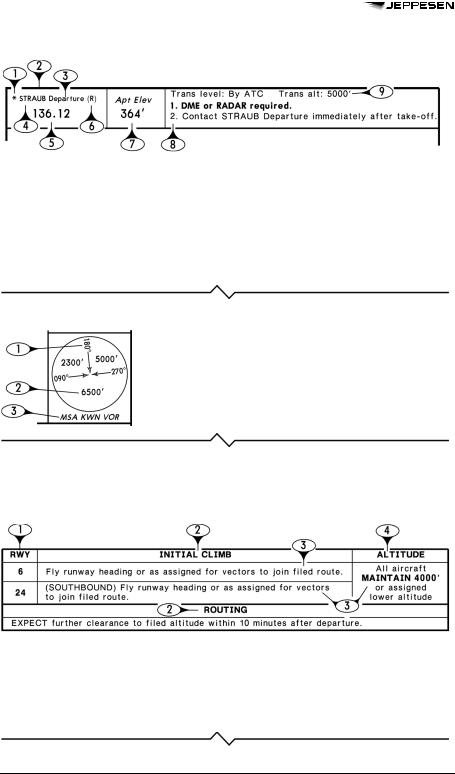
SID/STAR-2 |
INTRODUCTION |
2 MAR 12 |
BRIEFING INFORMATION
1 — Indicates the service is part time.
2 — SID/DP Initial Departure Control Services or STAR Weather Services (e.g. ATlS) are depicted.
3 — Function of the service is shown when applicable.
4 — Service call sign is shown when transmit and receive, or transmit only ops are available. The call sign is omitted when the service is broadcast only or has a secondary function.
5 — All available primary frequencies are depicted.
6 — Indicates that radar services are available.
7 — Airport elevation is provided for Arrival/Departure airport.
8 — Procedure restrictions and instructions. Required equipment notes are prominently displayed.
9 — Transition Level and Altitude.
MINIMUM SAFE or SECTOR ALTITUDE (MSA)
1 — Sector defining Radial/Bearing, always depicted inbound for the Navaid, Fix or Airport Reference Point (ARP).
2 — Minimum safe/sector altitude.
3 — Navaid/Fix/ARP the MSA is predicated on.
NOTE: Normal coverage is a 25 NM radius from the forming facility/fix. If the protected coverage is other than 25 NM, that radius is depicted below the forming facility/fix. MSA is provided when specified by the governing authority for any procedure serving the airport.
CLIMB and ROUTING INSTRUCTIONS TABULATED TEXT BOX
Text description might be provided, in addition to the graphic, when it is supplied by the governing authority. Text should be used in conjunction with the graphic to fully understand the procedure to be flown. Neither the text nor the graphic is a stand alone representation of all instructions, speed, and altitude restrictions, but are a combined representation of the procedure.
Tabulated Text boxes, which include a wide variety of actions, instructions, or restrictions for the pilot, have certain common elements of design for SID, DP and STAR procedures.
1 —
2 —
General identification applying to certain |
3 — Textual description, which compliments the |
sections of the procedure, such as Runway, |
graphic-based depictions or unique instructions, |
Arrival or SID identification. |
that cannot be graphically represented. |
Segment of flight, such as Initial Climb, Routing, 4 — General restriction that cannot be incorporated or Landing may be identified. in the graphic or that would enhance
understanding of procedure.
© JEPPESEN, 2012. ALL RIGHTS RESERVED.
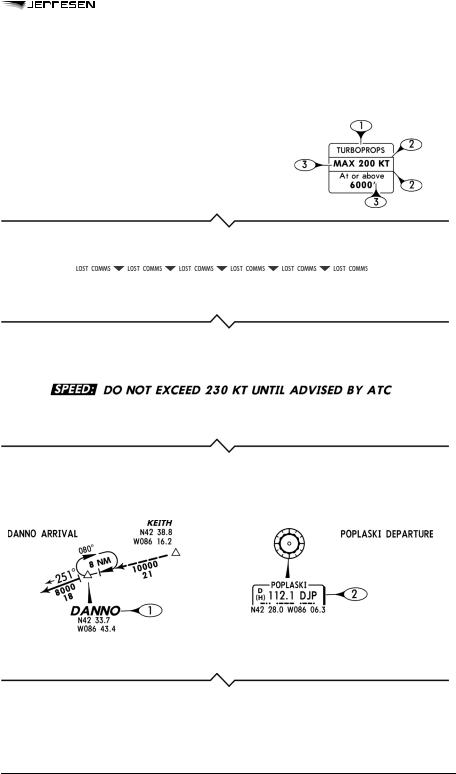
2 MAR 12 |
INTRODUCTION |
SID/STAR-3 |
GRAPHIC — INFORMATION BOXES
Information boxes are generally tied to the track, fix, or navaid to which the information applies. The content is associated with the graphic depiction on SID, DP, and STAR charts. Information boxes include a wide variety of actions, instructions, or restrictions.
Though information boxes vary widely based on the complexity of procedures, they do have certain common elements of design.
1 — Heading, if included, represent the who, what, where, or why of the information box.
2 — Instruction lines are used to separate instructions and conditions for improved clarity.
3 — Instructions or conditional statements associated with track, fix, navaid, or procedure.
GRAPHIC — LOST COMMUNICATIONS PROCEDURE
Unique lost communication instructions, provided by the governing authority for a procedure, are placed within the graphic and are outlined by the lost communication boundary.
GRAPHIC — SPEED RESTRICTIONS
Speed restrictions that apply to the entire procedure are shown below the procedure title.
Speed restrictions vary widely within individual procedures. They can be in the tabulated text, boxed, and/or placed in information boxes at the associated track, fix or phase of flight.
GRAPHIC — STARTING POINT AND END POINT OF STAR, DP, AND SID PROCEDURES
Navaids, intersections, or waypoints identified in the procedure title are shown prominently for easy identification of the starting points on STARs, and the ending points on SID or DP procedures.
1 — Intersection or waypoint names are shown in larger text.
2 — Navaid boxes include a shadowed outline.
© JEPPESEN, 2012. ALL RIGHTS RESERVED.
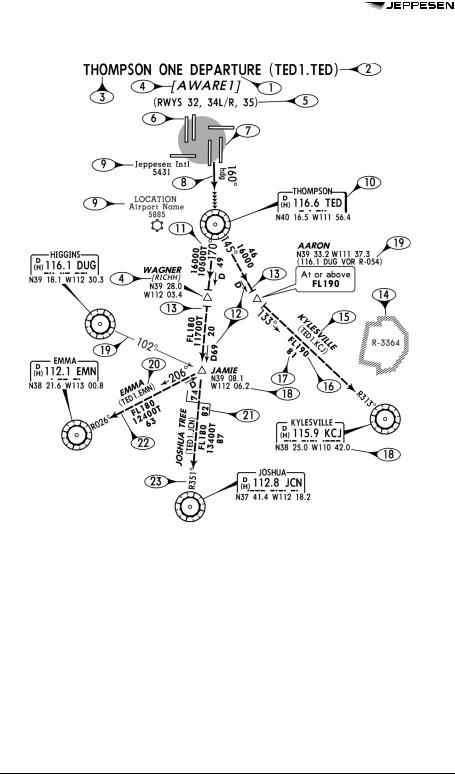
SID/STAR-4 |
INTRODUCTION |
2 MAR 12 |
GRAPHIC
1 — Type of procedure.
2 — Arrival/Departure code.
3 — Arrival/Departure name.
4 — Database identifiers are included when different than the Arrival/Departure code or name.
5 — Specified qualifying statements, such as runways, navigational requirements, or aircraft type. Runway layout is provided for all hard surface runways.
Arrival/Departure airport is highlighted with circular screen.
8 — Arrival/Departure track of procedure represents a common course used by multiple transitions. 9 — Airport is listed only when SID, DP, or STAR also serves multiple airports, which are screened. 10 — Starting Point of STAR and end point of SID/DP procedures are shown prominently.
11 — T placed after altitude denotes a Minimum Obstruction Clearance Altitude (MOCA).
12 — Radial and DME forms the fix. The DME, if not displayed is the segment distance, if shown it is the total distance from the forming Navaid.
13 — Altitude T is placed when the altitude changes along a track at other than a Navaid.
14 — Certain Special Use Airspace Areas are charted when referenced in procedure source.
© JEPPESEN, 2012. ALL RIGHTS RESERVED.

|
|
2 MAR 12 |
INTRODUCTION |
SID/STAR-5 |
15 |
— |
Transition name placed on the last segment of the SID/DP and the first segment of STAR procedures. |
||
16 |
— |
Minimum Enroute Altitude (MEA) unless otherwise designated. |
|
|
17 |
— |
Segment distance. |
|
|
18 |
— |
Coordinates of fix or Navaids. |
|
|
19 |
— |
Formation radials are presented in many ways based on Navaid position & compositional space. |
||
20 |
— |
Route identification code. |
|
|
21 |
— |
At the Changeover point, the pilot changes primary navigation to the next Navaid. |
|
|
22 — |
Transition track. |
|
|
|
23 |
— |
VOR radial on which aircraft is flying inbound towards the Navaid. |
|
|
END OF SID/DP AND STAR LEGEND
© JEPPESEN, 2012. ALL RIGHTS RESERVED.
